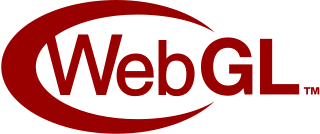Related Research Articles
Application streaming is a form of on-demand software distribution. In these scenarios, only essential portions of an application's code need to be installed on the computer: while the end user performs actions in the application, the necessary code and files are delivered over the network as and when they are required.
Google I/O, or simply I/O, is an annual developer conference held by Google in Mountain View, California. The name "I/O" is taken from the number googol, with the "I" representing the "1" in googol and the "O" representing the first "0" in the number. The format of the event is similar to Google Developer Day.
Opera is a multi-platform web browser developed by its namesake company Opera. The browser is based on Chromium. Opera is available on Windows, macOS, Linux, Android, and iOS. There are also mobile versions called Opera Mobile and Opera Mini. Opera users also have access to Opera News, a news app based on an AI platform.
Google Chrome is a cross-platform web browser developed by Google. It was first released in 2008 for Microsoft Windows, built with free software components from Apple WebKit and Mozilla Firefox. Versions were later released for Linux, macOS, iOS, and also for Android, where it is the default browser. The browser is also the main component of ChromeOS, where it serves as the platform for web applications.

Chromium is a free and open-source web browser project, mainly developed and maintained by Google. This codebase provides the vast majority of code for the Google Chrome browser, which is proprietary software and has some additional features. Chromium's logo is identical in shape to that of Google Chrome, but with blue colors instead of being multicolor.

ChromeOS, sometimes styled as chromeOS and formerly styled as Chrome OS, is a Linux-based operating system developed and designed by Google. It is derived from the open-source ChromiumOS and uses the Google Chrome web browser as its principal user interface.

WebGL is a JavaScript API for rendering interactive 2D and 3D graphics within any compatible web browser without the use of plug-ins. WebGL is fully integrated with other web standards, allowing GPU-accelerated usage of physics, image processing, and effects in the HTML canvas. WebGL elements can be mixed with other HTML elements and composited with other parts of the page or page background.

The following outline is provided as an overview of and topical guide to Google:

Google TV was a smart TV operating system from Google co-developed by Intel, Sony and Logitech. It launched in October 2010 with official devices initially made by Sony and Logitech. Google TV integrated the Android 3.0/3.2 operating system and the Google Chrome web browser to create an interactive television overlay on top of existing online video sites to add a 10-foot user interface, for a smart TV experience.

WebM is an audiovisual media file format. It is primarily intended to offer a royalty-free alternative to use in the HTML5 video and the HTML5 audio elements. It has a sister project, WebP, for images. The development of the format is sponsored by Google, and the corresponding software is distributed under a BSD license.

Google Developer Day events were one-day web developer-focused gatherings around the world held annually by Google. They include seminars and codelabs focused on building of web, mobile, and enterprise applications with Google and open web technologies such as Android, HTML5, Chrome, App Engine, Google Web Toolkit and give participants an excellent chance to learn about Google developer products as well as meet the engineers who work on them.
Google Drive is a file storage and synchronization service developed by Google. Launched on April 24, 2012, Google Drive allows users to store files in the cloud, synchronize files across devices, and share files. In addition to a web interface, Google Drive offers apps with offline capabilities for Windows and macOS computers, and Android and iOS smartphones and tablets. Google Drive encompasses Google Docs, Google Sheets, and Google Slides, which are a part of the Google Docs Editors office suite that permits collaborative editing of documents, spreadsheets, presentations, drawings, forms, and more. Files created and edited through the Google Docs suite are saved in Google Drive.
HTML5 Audio is a subject of the HTML5 specification, incorporating audio input, playback, and synthesis, as well as, in the browser. iOS
Blink is a browser engine developed as part of the Chromium project with contributions from Apple, Google, Meta, Microsoft, Opera Software, Adobe, Intel, IBM, Samsung, and others. It was first announced in April 2013.

Chromecast is a line of digital media players developed by Google. The devices, designed as small dongles, can play Internet-streamed audio-visual content on a high-definition television or home audio system. The user can control playback with a mobile device or personal computer through mobile and web apps that support the Google Cast protocol, or by issuing commands via Google Assistant; later models introduced an interactive user interface and remote control. Content can be mirrored to video models from the Google Chrome web browser on a personal computer or from the screen of some Android devices.
Google Cast is a proprietary protocol developed by Google for playing Internet-streamed audiovisual content on a compatible consumer device. The protocol is used to initiate and control playback of content on digital media players, high-definition televisions, and home audio systems using a mobile device, personal computer, or smart speaker. The protocol was first launched on July 24, 2013, to support Google's first-generation Chromecast player. The Google Cast SDK was released on February 3, 2014, allowing third parties to modify their software to support the protocol. According to Google, over 20,000 Google Cast-ready apps were available as of May 2015. Support for Google Cast has since been integrated into subsequent devices, such as the Nexus Player and other Android TV devices, as well as soundbars, speakers, and later models of the Chromecast. Consumer devices that natively support the protocol are marketed as Chromecast built-in. As of October 2017, over 55 million Chromecasts and Chromecast built-in devices have been sold.
Android Runtime for Chrome (ARC) is a compatibility layer and sandboxing technology for running Android applications on desktop and laptop computers in an isolated environment. It allows applications to be safely run from a web browser, independent of user operating system, at near-native speeds.
References
- ↑ Google Developers Live. Developers.google.com (2013-11-25). Retrieved on 2013-11-29.
- ↑ Events — Google Developers. Developers.google.com. Retrieved on 2013-11-29.